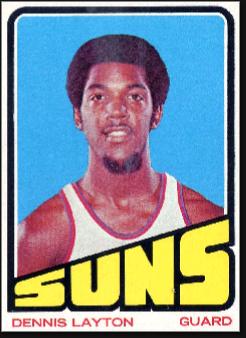
Sport: Basketball
Born: December 24, 1948
Town: Newark, New Jersey
Dennis Layton was born December 24, 1948 in Newark. He honed his game on the city’s playground, using his lightning speed and left-handed jumper to become one of the top young players in his neighborhood, which bordered Hillside and Elizabeth. The teenager everyone called “Mo” attended Weequahic High School and, in 1966–67, he led coach Les Fein’s varsity to a 27–0 record and the #1 ranking among U.S. prep teams. Mo’s backcourt partner was Billy Mainor, who moved to Newark from Jersey City his senior year. That season, the Indians were city, county, North Jersey and New Jersey champions.
Mo was scouted by several major college programs, but his academics were an issue with some of the top schools. He decided to go the junior college route to build up his transcripts and his whippet-thin body. Mo and Weequahic teammate George Watson accepted scholarships from Phoenix Junior College, and he played two years for the Bears. Mo averaged 22.8 points per game, and more than 40 years later Mo is still the school’s all-time leading scorer. He was also an A student.
In 1969, Mo was offered a scholarship by the University of Southern California. Coach Bob Boyd had just graduated his star guard, Mack Calvin, and needed a player who could step right into the lineup. Mo did just that. He teamed in the backcourt with sophomore Paul Westphal during the 1969–70 season and, together, they propelled the Trojans to an 18–8 record and a second-place conference finish. Mo led the team in points and assists, and was among the nation’s Top 25 free throw shooters at 82.8%.
In 1970–71, Mo and Paul gave USC a superb 1–2 punch, while gangly Ron Riley handled rebounding duties at center. All three would play in the NBA. Another important contributor was forward Joe Mackey, a superb outside shooter. Mo led the Trojans in scoring with 17.6 points per game. Westphal was the team’s top playmaker, but was also a slashing scorer who knew how to get to the line.
The two guards led USC to a 24–2 record and, briefly, the nation’s #1 ranking. The Trojans outscored opponents by an average of more than 15 points a game in their victories. Both losses came at the hands of Sidney Wicks and the UCLA Bruins, and both games were close. Unfortunately, that translated to a second-place finish in the PAC-10, and no bid to the NCAA Tournament—making the Trojans perhaps the greatest team ever to not be invited to participate in March Madness. Despite the snub, Mo was hailed as one of the top guards in the country, and made several All-American lists.
Mo projected as a quality support player in the pros. He was selected in the third round by the NBA Phoenix Suns and the second round by the ABA Utah Stars. The Stars had three excellent guards in Ron Boone, Glen Combs and Jimmy Jones. The Suns had the somewhat less daunting duo of Clem Haskins and Dick Van Arsdale. Mo chose to play in Phoenix, where he had friends from college, and averaged more than 20 minutes a game as the first guard off the bench his rookie year.
Near the end of Mo’s first season, the Suns traded Paul Silas for the rights to high-scoring guard Charlie Scott. That cut deeply into Mo’s playing time in 1972–73 and, the following year, he was cut by Phoenix in training camp. Mo caught on with the Portland Trailblazers, but they released him after 22 games. He played a handful of games for the Memphis Tams of the ABA, but could not find a job in either league the following season.
Mo returned home and, in 1976, made the Knicks as a backup to Earl Monroe and Walt Frazier. He turned in a pair of 20-point performance in the season’s first four games and averaged 5.8 points for the season, playing about 13 minutes per contest. He was a Garden favorite for the brief time he wore the Knicks uniform. The 1977–78 season was Mo’s last in the NBA. He played in 41 games for the San Antonio Spurs, who released him the following fall.
Mo made his way back to Phoenix, where he became a teacher and community leader. Trading on the relationships he had forged in college and the pros, he organized basketball camps and clinics, and coached nationally ranked wheelchair basketball teams. He continued to coach and officiate games into his 60s after moving back to New Jersey. In 2013, Mo was enshrined in the Phoenix College Hall of Fame.